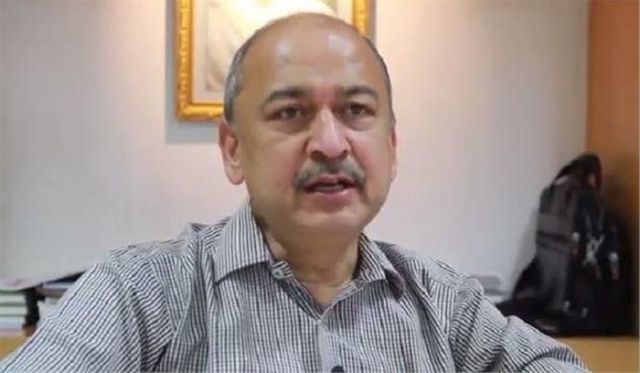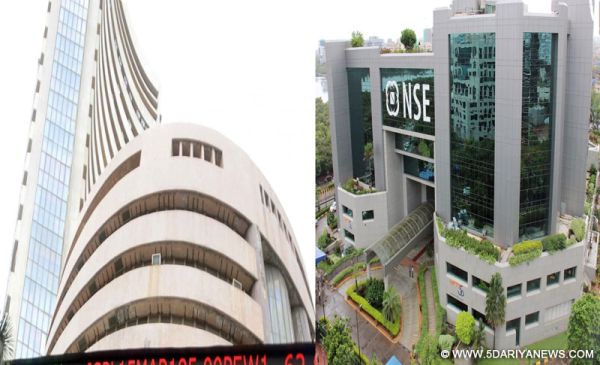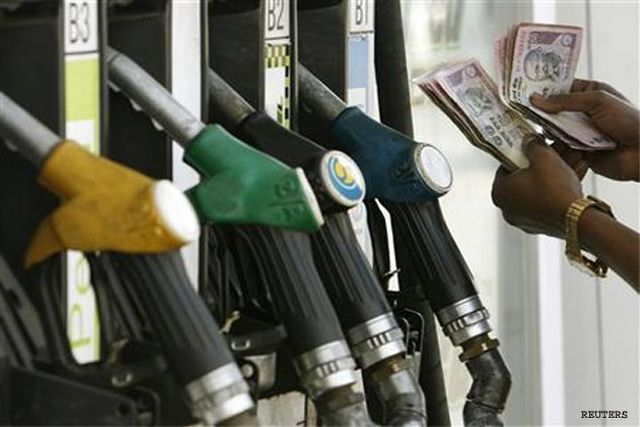
by Editor | May 25, 2021 | Commodities, Commodities News, Corporate, Corporate Buzz

Pradeep Singh Kharola
By Rohit Vaid,
New Delhi : Crude oil prices at around $60 per barrel is the “ideal” level for Air India to sustain its new-found revenue growth, the airline’s Chairman and Managing Director (CMD) Pradeep Singh Kharola said.
When asked about the surge in crude oil prices and its impact on Air India’s revenue growth, Kharola told IANS: “I believe the airline is comfortable with oil prices being in the range of $60-65 per barrel.”
“Anything beyond this range will obviously erode our bottomline,” he said at the company’s HQ — Airlines House — located here.
Several global factors like production curbs and high demand have led to a surge in crude oil prices to a three-year high. As of January 18, 2018, it hovered around the $70-a-barrel mark.
Crude prices are important for airlines, as jet fuel, which is a refined product, is heavily taxed in India and forms a major cost component.
The new CMD pointed out that on a year-on-year basis the airline has grown its revenues by around 10 per cent during April-December 2017. He, however, did not disclose any figures.
Recently, Parliament was informed that Air India is expected to report a net loss of Rs 3,579 crore for 2017-18 as per “(budget estimates) (projected)” from a (provisional) net loss of Rs 3,643 crore for 2016-17.
On the other hand, the airline is projected to increase its operating profit to Rs 531 crore (BE projected) for 2017-18 from a provisional operating profit of Rs 215 crore for 2016-17.
The airline, which is under a massive debt burden of Rs 50,000 crore, had posted an operating profit of Rs 105 crore in 2015-16, and is expected to report an improved operating profit margin for the last fiscal.
According to Kharola, the airline plans to increase its revenue by focusing on the business class segment by providing better services in terms of food and beverages and entertainment options.
In terms of new international services, Kharola said that the airline is expected to commence a New Delhi-Los Angeles flight within the next two-three months and increase frequencies to Australia.
In regard to the ongoing discussion surrounding the divestment process, Kharola distanced himself and stated that his mandate is “to improve the airline’s efficiencies and to keep a tab on costs”.
However, he said, efforts are under way to safeguard employees’ interests. Air India has over 11,000 employees, whereas at the group level, including its subsidiaries, the number of staffers goes up to about 20,000.
Currently, a ministerial panel is firming up the contours of the strategic divestment — of at least 51 per cent stake — in Air India and its subsidiaries.
Last month, consulting multinational EY had been appointed as transaction advisors to aid the government in the strategic divestment process.
(Rohit Vaid can be contacted at rohit.v@ians.in)
—IANS

by Editor | May 25, 2021 | Economy, Markets, News
 Mumbai : The key indices of the Indian equity market closed Wednesday’s trade session on a flat note after investors booked profit in automobile and oil and gas stocks.
Mumbai : The key indices of the Indian equity market closed Wednesday’s trade session on a flat note after investors booked profit in automobile and oil and gas stocks.
According to market analysts, profit booking and a rise in global crude oil prices pared the initial gains made on the back of positive Asian markets.
Consequently, the 30-scrip S&P BSE Sensex, which had ended the previous session at 33,812.26 points, closed at 33,793.38 points, down a mere 18.88 points or 0.06 per cent.
However, there was a swing of over 200 points between the intra-day high and low levels. The Sensex touched a high of 33,998.37 points and a low of 33,765.43 points on an intra-day basis.
Similarly, the National Stock Exchange’s (NSE) Nifty50 closed on a flat note. It ended the day’s trade at 10,443.20 points, inching up by only 1 point or 0.01 per cent.
“Markets ended on a flat note on Wednesday after witnessing a roller coaster ride. The main indices initially opened higher and hit a fresh intra-day high in morning trade. They then hovered in positive territory on the back of positive global cues before profit booking emerged at higher levels in mid-morning trade,” Deepak Jasani, Head, Retail Research, HDFC Securities, told IANS.
Said Vinod Nair, Head of Research, Geojit Financial Services: “Metals outperformed on expectation of earnings growth whereas auto stock witnessed profit booking after the recent run up. Investors are awaiting the result season to begin for signs of earnings upgrade.”
On the currency front, the Indian rupee weakened by six paise to close at 63.53-54 against the US dollar from its previous close at 63.48.
Provisional data with the exchanges showed that foreign institutional investors purchased scrips worth Rs 96.31 crore while domestic institutional investors sold stocks worth Rs 269.20 crore.
Sectorwise, the S&P BSE automobile index fell by 147.19 points, oil and gas index by 42.63 points and IT index by 35.75 points.
On the other hand, S&P BSE capital goods index rose by 285.04 points, followed by metal index by 202.16 points and consumer durables index by 181.61 points.
Major Sensex gainers on Wednesday were: Adani Ports and Special Economic Zone, up 2.78 per cent at Rs 407.85; Larsen and Toubro, up 2.17 per cent at Rs 1,276.15; ICICI Bank, up 1.88 per cent at Rs 315.05; Yes Bank, up 1.33 per cent at Rs 315.80; and Hindustan Unilever, up 0.80 per cent at Rs 1,350.10.
Major Sensex losers were: DrReddy’s Lab, down 2.97 per cent at Rs 2,336.20; Wipro, down 2.73 per cent at Rs 310.20; ONGC, down 1.65 per cent at Rs 193.70; Bajaj Auto, down 1.42 per cent at Rs 3,247.45; and Maruti Suzuki, down 1.35 per cent at Rs 9,416.75.
—IANS

by Editor | May 25, 2021 | Commodities, Commodities News, World
 By Barry Ellsworth,
By Barry Ellsworth,
Trenton, Canada : Crude oil will start flowing again through the Keystone XL pipeline Tuesday after it was shut down earlier this month due to a 210,000-gallon spill in South Dakota.
TransCanada Corporation said Monday in a release that the repair and restart plans “have been reviewed by the Pipeline and Hazardous Materials Safety Administration (PHMSA) with no objections, permitting a safe and controlled return to service of the Keystone System.”
But TransCanada said that as a precaution, the restart would be at reduced pressure “to ensure a safe and gradual increase in the volume of crude oil moving through the system”.
The pipeline, which carries crude oil from the Alberta Oil Sands in Canada to Houston, Texas, normally handles 590,000 barrels per day.
The spill, which occurred Nov. 16, was the largest in South Dakota’s history.
The off-again, on-again TransCanada pipeline has had a controversial history.
The company proposed a route through Montana to increase capacity. It was turned down by President Barack Obama in 2015 but reversed by President Donald Trump.
TransCanada also proposed a route through Nebraska, and despite the South Dakota spill, the state gave its approval but threw a wrench into the works when it approved an alternate route.
Canadian media reported Tuesday that TransCanada asked that the Nebraska Public Service Commission reconsider its ordered route change.
But TransCanada spokesman Terry Cunha said the company is not asking for the route to be reconsidered but rather involves explaining some questions about the change.
The Nebraska approval clears away the last hurdle for the Keystone pipeline to carry about 830,000 barrels a day to the U.S. market.
—AA

by Editor | May 25, 2021 | Business, Commodities, Commodities News, Corporate, Corporate Governance, Large Enterprise
 New Delhi : The Indian basket of imported crude oils gained nearly $3.50 a barrel during last week even as petrol prices in the country touched their highest levels since Prime Minister Narendra Modi assumed office three years ago, official data showed on Monday.
New Delhi : The Indian basket of imported crude oils gained nearly $3.50 a barrel during last week even as petrol prices in the country touched their highest levels since Prime Minister Narendra Modi assumed office three years ago, official data showed on Monday.
The Indian basket, comprising 73 per cent sour-grade Dubai and Oman crudes, and the balance in sweet-grade Brent, closed trade on the weekend on Friday at $53.63 per barrel, according to the Petroleum Ministry. The oil basket had gained over a dollar at the start of last week on Monday to close at $51.34 for a barrel of 159 litres.
Meanwhile, under the daily revision of fuel prices, petrol in Mumbai on Monday cost Rs 79.41 a litre, breaching the level it last touched in August 2014.
Petrol price was hiked by 13 paise a litre and diesel by 25 paise per litre, applicable from 6 a.m. on Monday. Petroleum products do not come under the Goods and Services Tax (GST) and prices vary at locations according to state taxes.
On Monday, petrol per litre cost Rs 70.30 in Delhi, Rs 73.05 in Kolkata and Rs 72.87 in Chennai.
Similarly, diesel price on Monday was Rs 58.62 in Delhi, Rs 61.27 in Kolkata, Rs 62.26 in Mumbai and Rs 61.73 in Chennai.
Earlier this month, Petroleum Minister Dharmendra Pradhan said the dynamic pricing regime would continue despite petrol prices going up by over Rs 7 per litre since the scheme was introduced pan-India from mid-June.
He said dynamic pricing ensures that the benefit of even the smallest change in international oil prices can be passed down the line to the dealers and the end-users.
“Daily revision in prices is good. When we started daily revisions on June 16, rates dropped in the first fortnight. Thereafter, it has increased mainly because of rise in global oil prices,” he said.
Daily revision allows any fall in international oil rates to be passed on to consumers immediately rather than having to wait for 15 days as in the old system, he added.
“Should prices be hiked by Rs 2.50 or Rs 3 per litre in one go or they should be spaced out in small doses,” he asked.
Earlier, the state-run oil marketing companies used to review and revise retail fuel prices every fortnight on the basis of global crude oil prices, while the revision took effect from midnight.
Dynamic fuel pricing is followed in many developed countries and India opted for it as a response to the recent volatility in global crude oil prices.
The basket of crude oils of the 13-nation Organisation of Petroleum Exporting Countries (OPEC) breached the psychologically-important $50-a-barrel-mark also last week, to close at $50.36 a barrel on September 4. As per latest data, the OPEC basket closed on Friday at $52.53.
Last month, two of OPECs biggest members — Saudi Arabia and Iraq — expressed their commitment to abide by an agreement to cut oil production that was signed earlier between OPEC and 10 other nations.
—IANS




